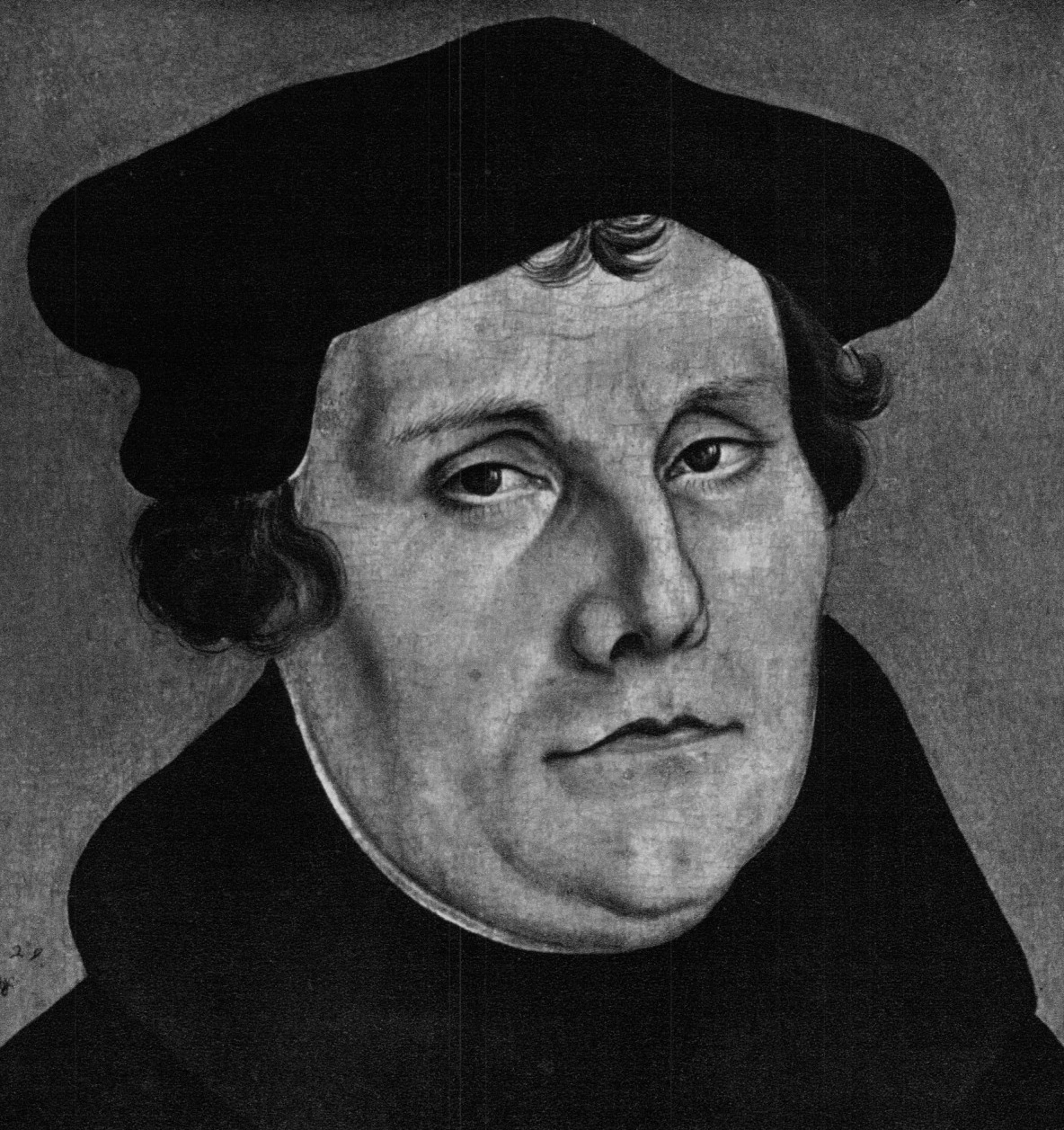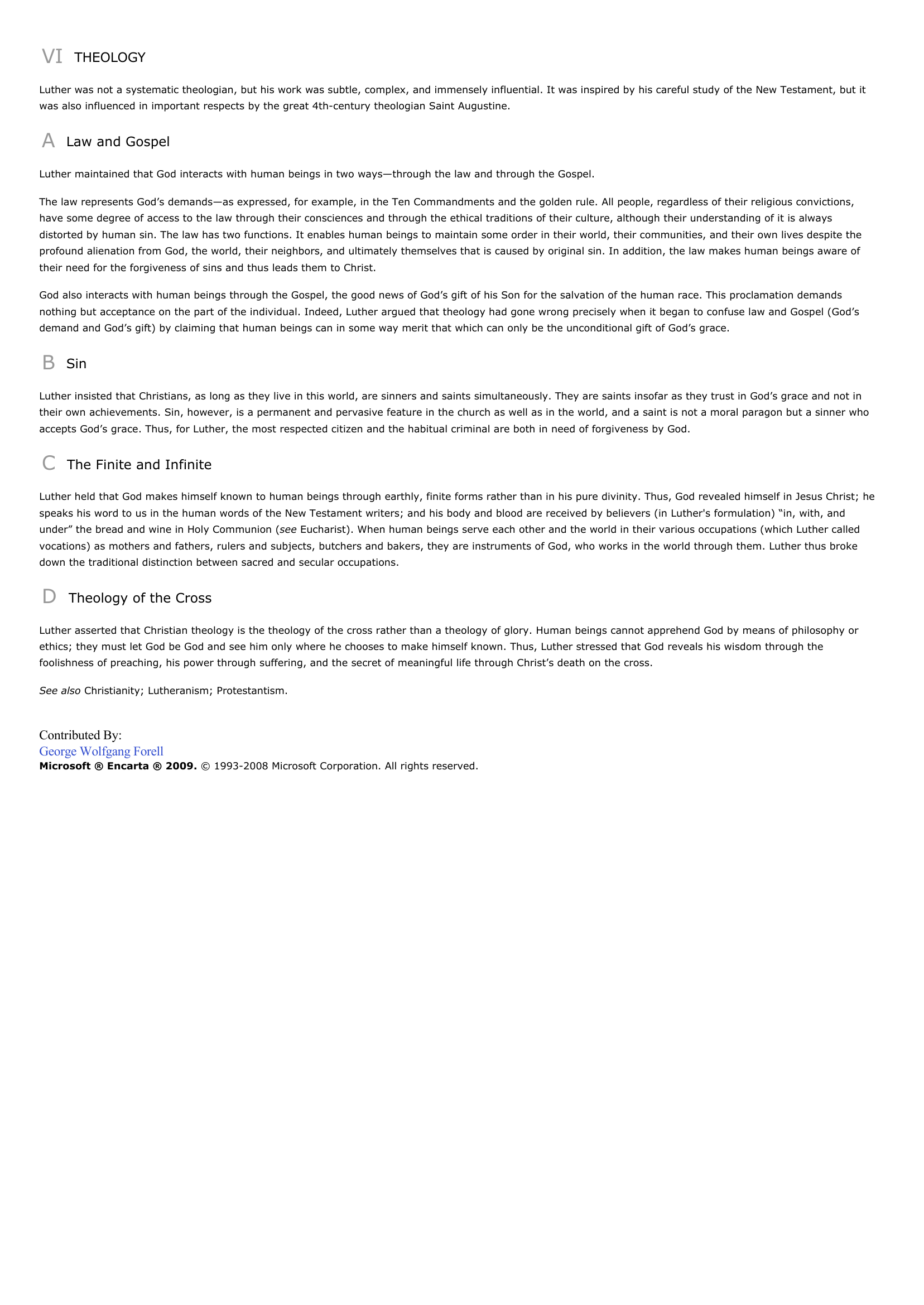Martin Luther I INTRODUCTION Martin Luther (1483-1546), German theologian and religious reformer, who
Publié le 10/05/2013

Extrait du document


«
VI THEOLOGY
Luther was not a systematic theologian, but his work was subtle, complex, and immensely influential.
It was inspired by his careful study of the New Testament, but itwas also influenced in important respects by the great 4th-century theologian Saint Augustine.
A Law and Gospel
Luther maintained that God interacts with human beings in two ways—through the law and through the Gospel.
The law represents God’s demands—as expressed, for example, in the Ten Commandments and the golden rule.
All people, regardless of their religious convictions,have some degree of access to the law through their consciences and through the ethical traditions of their culture, although their understanding of it is alwaysdistorted by human sin.
The law has two functions.
It enables human beings to maintain some order in their world, their communities, and their own lives despite theprofound alienation from God, the world, their neighbors, and ultimately themselves that is caused by original sin.
In addition, the law makes human beings aware oftheir need for the forgiveness of sins and thus leads them to Christ.
God also interacts with human beings through the Gospel, the good news of God’s gift of his Son for the salvation of the human race.
This proclamation demandsnothing but acceptance on the part of the individual.
Indeed, Luther argued that theology had gone wrong precisely when it began to confuse law and Gospel (God’sdemand and God’s gift) by claiming that human beings can in some way merit that which can only be the unconditional gift of God’s grace.
B Sin
Luther insisted that Christians, as long as they live in this world, are sinners and saints simultaneously.
They are saints insofar as they trust in God’s grace and not intheir own achievements.
Sin, however, is a permanent and pervasive feature in the church as well as in the world, and a saint is not a moral paragon but a sinner whoaccepts God’s grace.
Thus, for Luther, the most respected citizen and the habitual criminal are both in need of forgiveness by God.
C The Finite and Infinite
Luther held that God makes himself known to human beings through earthly, finite forms rather than in his pure divinity.
Thus, God revealed himself in Jesus Christ; hespeaks his word to us in the human words of the New Testament writers; and his body and blood are received by believers (in Luther's formulation) “in, with, andunder” the bread and wine in Holy Communion ( see Eucharist).
When human beings serve each other and the world in their various occupations (which Luther called vocations) as mothers and fathers, rulers and subjects, butchers and bakers, they are instruments of God, who works in the world through them.
Luther thus brokedown the traditional distinction between sacred and secular occupations.
D Theology of the Cross
Luther asserted that Christian theology is the theology of the cross rather than a theology of glory.
Human beings cannot apprehend God by means of philosophy orethics; they must let God be God and see him only where he chooses to make himself known.
Thus, Luther stressed that God reveals his wisdom through thefoolishness of preaching, his power through suffering, and the secret of meaningful life through Christ’s death on the cross.
See also Christianity; Lutheranism; Protestantism.
Contributed By:George Wolfgang ForellMicrosoft ® Encarta ® 2009. © 1993-2008 Microsoft Corporation.
All rights reserved..
»
↓↓↓ APERÇU DU DOCUMENT ↓↓↓
Liens utiles
- Luther Martin, 1483-1546, né à Eisleben (Saxe), théologien allemand, un des promoteurs de la Réforme.
- Martin Luther (1483-1546) Le luthéranisme ou la Bible comme seule autorité en matière de foi.
- Galileo I INTRODUCTION Galileo (1564-1642), Italian physicist and astronomer who, with German astronomer Johannes Kepler, initiated the scientific revolution that flowered in the work of English physicist Sir Isaac Newton.
- Henry VIII I INTRODUCTION Henry VIII (1491-1547), king of England (1509-1547), the image of the Renaissance king as immortalized by German artist Hans Holbein, who painted him hands on hips, legs astride, exuding confidence and power.
- Luther's Ninety-Five Theses German theologian Martin Luther publicly condemned the practice of buying indulgences on October 31, 1517.





